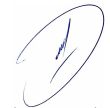Servicios Personalizados
Revista
Articulo
Links relacionados
Compartir
Odontoestomatología
versión impresa ISSN 0797-0374versión On-line ISSN 1688-9339
Odontoestomatología vol.18 no.28 Montevideo nov. 2016
Editorial

First, I wish to express my sincere gratitude to the editorial team of Odontoestomatología, journal of the School of Dentistry, Universidad de la República, Uruguay, for inviting me to write the editorial of their prestigious publication.
I would like to take this opportunity to review a few of the criteria followed in scientific publications and editorial work, for instance, making the total or partial results of a line of research visible. This work is possible thanks to a team of researchers that make the scientific process explicit in all its aspects by following rigorous methodological guidelines.
Nowadays, scientific communication, as reflected on the journals we know, broadens our horizon and outlook on the development of an area of knowledge.
Globalization has allowed us to increase knowledge and to help professionals work beyond a restricted environment.
This is how we are able to compare our work to evidence found by others anywhere in the world, process which fosters knowledge creation and encourages international scientific collaboration. This is how scientific rigor is possible, starting from affiliation: nowadays it is essential for universities and other institutions to develop clear and accurate protocols to avoid common errors.
Additionally, scientific papers need to be verifiable, mainly their sources, which helps the publication have a strong impact for both the author and the institution.
I would also like to commend editorial work, an extremely complex process which requires commitment, responsibility, motivation and the necessary funding.
Finally, I believe it is fundamental for university institutions to create and professionalize a team that will review, measure and evaluate the scientific work published by their institutions, as this process requires more attention nowadays, as opposed to the number of publications and, to a greater or lesser extent, the impact factor. However, it is clear that to close the circle we must develop good practices, which is in turn fundamental to foster local, regional and global scientific development.

Dr. Alex Bustos Leal
Specialist in Public Health, MSc in Family Health
Doctor of Dentistry, Dean of the School of Dentistry
Universidad de Concepción - Chile











 texto en
texto en 


